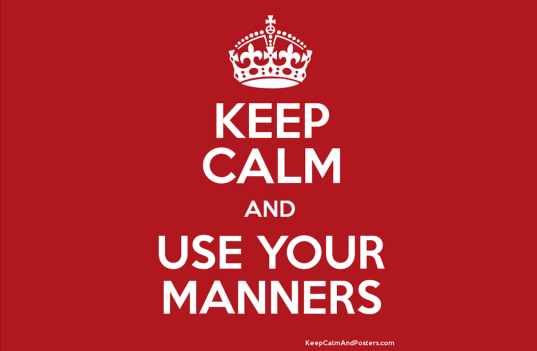In New York City in the 1990’s the NYPD under Police Commissioner Bratton and Mayor Guiliani implemented a number of strategies to combat the rising crime rates. One of these was ‘zero tolerance’, which in simple terms focussed on not accepting (or turning a blind eye) to ‘minor’ crimes such as graffiti and subway turnstile-jumping.
Rolling onto 2018, one of the most consistent messages to come from the Royal Commission was the need to change the prevailing culture. Rolls smoothly off the tongue, and is a view that most would agree with, BUT it’s a tad harder to achieve. And it will take time and determined focus. Lots of transformation teams, development programs, focus groups, buzz words etc ahead!
But, in the short term, I wonder whether a ‘zero tolerance’ approach might be a very simple, easily ‘doable’ place to start?
I’ve listed a few simple strategies below – all of which could be implemented overnight and cost absolutely $0. And they apply to every one of us.
The etiquette of business
- At the risk of sounding very old (much prefer ‘mature’),
- Answer emails – nothing worse than going to the bother of writing to someone who doesn’t respond. Did they get it? Are they interested in discussing or not?
- Don’t be ‘afraid’ to say ‘no’ up front – as opposed to saying ‘interesting’/we’ll get back to you, if you have no intention to. Also, if ‘no’ is to be the answer, don’t ‘gild the lily by using a soft excuse’. Be explicit in the reason why the answer is ‘no’. Fairer for all.
- Start and finish meetings (in person, online, teleconference whatever) on time, prepare for them, turn mobiles off. But if you have to leave the mobile on, at least pay the other attendees the courtesy of forewarning them.
- And, if you’re running late, pay your guest the courtesy of letting them know (text will do).
- If you’ve been referred, make sure you keep the referrer updated on what’s happened.
- Take time out to check your ‘persona’….ring your office after hours …how does your message sound (you do have one, right!). If your lines are all busy, what happens…what message is left; what music is played? Make an enquiry through your website – how long did it take for you to get a personalised and professional response?
Respect for others
- Don’t be afraid to say ‘thank you’ if someone has done you a favour. A personal phone call, or even handwritten note – much better than an ‘impersonal’ email.
- Do what you say you’re going to do and if you’re not able to, be upfront and say so.
- Simply not answering/responding to a phone call or email shouldn’t equate to a ‘no thank you’. If someone contacts you, don’t they deserve the courtesy of a formal response, even if it is a ‘no’?
- How easy is it for someone (outside your normal contacts) to actually get in touch with you by phone or email? It seems that some institutions have turned this bleedingly simple task into a task akin to the quest for the meaning of life (in other words, almost impossible).
- As tempting as it is, don’t abrogate all communication to email. Ideally, they should be used to confirm, not to build meaningful relationships with those you work with.
- Encourage and facilitate your firm’s support for local charities and causes. Your staff will know how.
- While awareness of the staff’s health and well being, has very much been the province of larger companies, it’s been extremely gratifying to note that smaller companies are also doing their bit – paid subscriptions for staff at the local gym, masseur on site once a month, team exercise classes and inviting health professionals to come into the office are all great examples of how innovative, respectful firms are approaching directly the challenge of staff wellness.
Leadership
Calling all leaders – now is your time. Clear, consistent and regular communication of your standards, beliefs and business goals is desperately needed. You may, on occasion, need to call out unacceptable behaviour – but hey, that’s what leadership is all about, right!
- Do you provide your staff, product and aligned business partners with a progress to your plan (you do have a fully documented business plan, right?).
- Do you recognise and reward the results you’re looking for from your people? It could be a special mention at a team meeting or in a newsletter, announcement on your website or an unexpected ‘one off’ payment.
- If superior service standards or ‘better than average’ client satisfaction for example is a stated goal of your firm, does your remuneration structure reflect it? But remember – you can’t manage what you can’t measure – clearly defined objectives please!
- Do you recognise (team meeting, newsletter, website) when someone has performed very well – glowing feedback from a client, going the extra mile to complete an important job task on time or making a suggestion to improve the business are all good examples.
- Innovation – we all have budget constraints, but that doesn’t mean that we can’t provide real meaningful benefit to our staff in a non-monetary way for a job well done – flexible working hours, reimbursement for professional development, paid time off for volunteer work, clean the house day (for your employee of the month), financial planning advice for all staff (surely a no brainer) and half day Fridays for example.
It’s all about walking not talking – provide ‘proof points’ to back up your beliefs and standards. If client satisfaction is your goal – commit to surveying your clients regularly to assess your progress.
Like I said – very simple, easily ‘doable’.
For your consideration.
Terry Bell.

